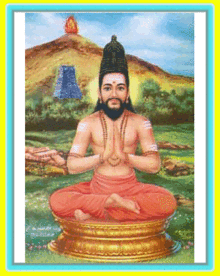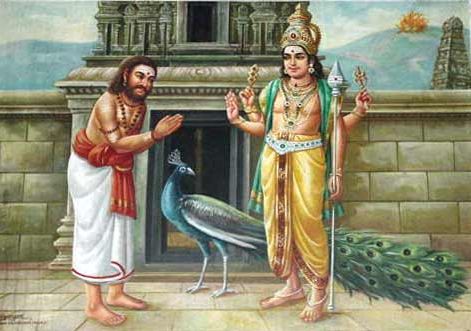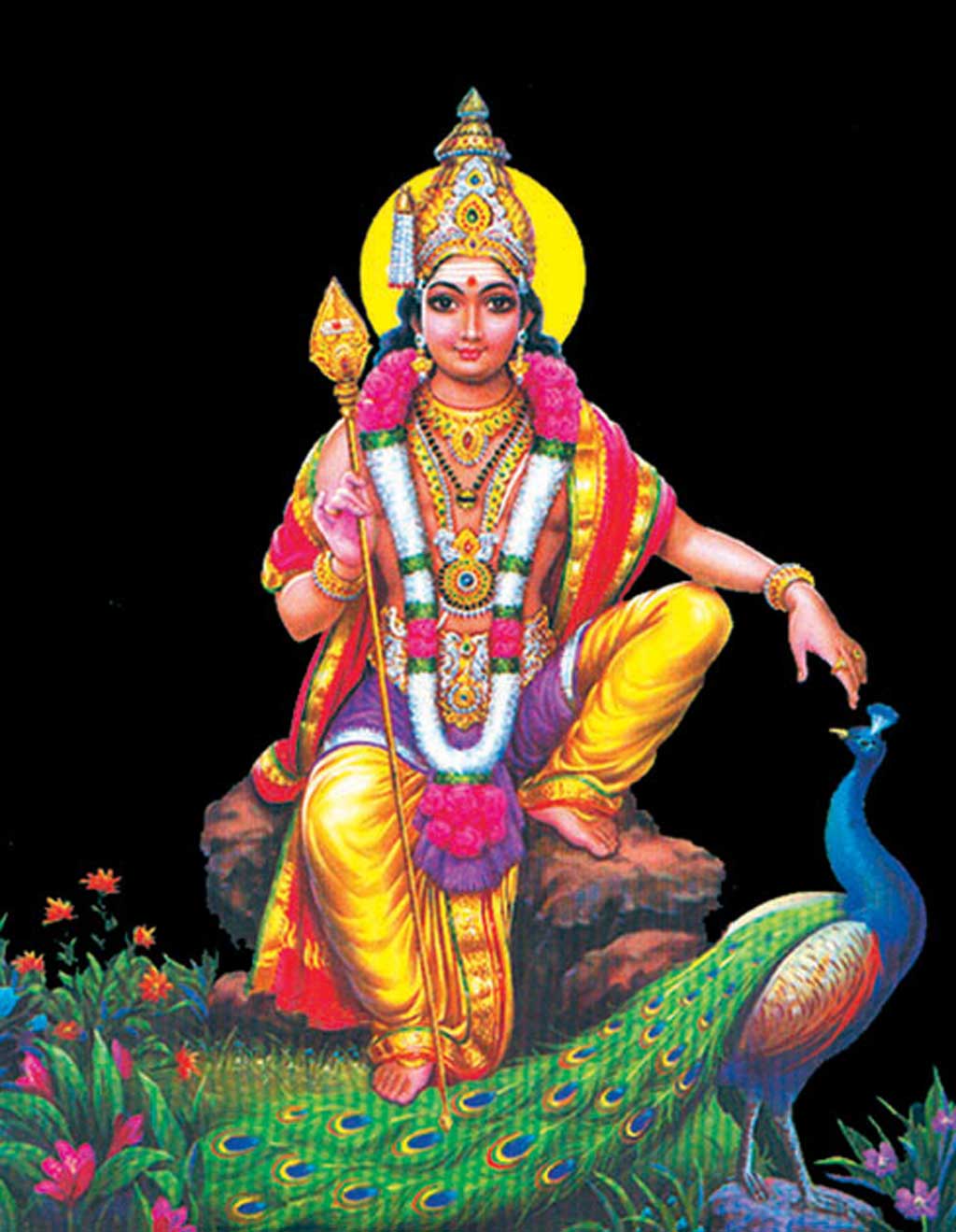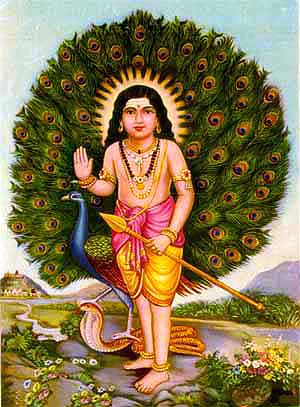
Overwhelmed in devotion, Muthamma, a pious lady of Tiruvannamalai, prayed that she should be blessed with a child who would excel not only in her devotion but also in knowledge. It was sometime in 15th century and the God she prayed was Lord Arunachala. The Lord heard her prayer and blessed her with a son. The son, named after the mountain of Tiruvannamalai, as Arunagiri, rose as high as the mountain in his vision and devotion.
Even from his young age, Arunagiri was spiritually inclined. He studied Vedanta, the philosophy in general, Sidhanta, the philosophy in particular, Itihas and Purana. The Saiva Sidhantam propounded by Sidhars like Tirumular made an enormous impact on him. He realized that the body is the temple where God resides. Lord Siva shines as the Atma Linga within. Perhaps, the body has not functioned in accordance with the divinity within and he decided to discard the body and merge himself with the God. He then went up the temple tower and fell from there. But rather than falling in the hard surface of the ground Arunagiri found himself in the strong hands of a savior. “Why have you saved me?” Arunagiri asked the saviour. “You are born not to die but to live and sing”, the saviour replied. “Your body has many better uses. You are the chosen one to sing the glory of Lord Muruga. Render the songs that would liberate devotees from bondages and uplift them to real happiness,” said the saviour.

Soon, Arunagiri realized that the saviour was none other than Lord Muruga. He saw in his vision, Muruga standing majestically, the sparkling Vel in his hands and the beautiful peacock nearby. It was as if thousand suns were rising simultaneously, radiating brilliant rays of grace. Arunagiri stood still for a while, unable to believe his eyes. He folded his hands before the Lord and sought His blessings. Arunagiri realized that Muruga has come before him not as a God to dispense favours but as a Guru to impart Jnana. The Lord then initiated his disciple to saint-hood, gave him the advice and blessed him to carry on his divine mission. By the prompting of Muruga, Arunagirinathar rendered his first song ‘Muthai Tharu’ that turned out to be an outstanding verse of devotion. The experience has transformed him as a realized sage. At the command of God, Arunagirinathar went to Vayalur and stood there in meditation. It is believed that the Lord has come to his vision again and set out the task before him. “Sing about me, about my Vel (lance), about my peacock (Mayil) about Seval (rooster), about Vayalur and about my various other abodes”. It is indeed a rare honour to be able to sing Thy glory”, Arunagiri said and prostrated before Vayalur Muruga in total surrender. After getting blessings from Ganapati at Vayalur, Arunagiri did his second song expressing his happiness. “Oh Lord, you have given me the privilege of singing your glory (Thiruppugazh). You have also graced me the talent and skill to compose thy verses. I would never forget this grace bestowed on me.” (“Thiruppugazh Viruppamodu Seppana Enakkarulgai Maravene”). Lord of Vayalur was always at his heart and Arunagiri made pointed reference to Vayaluran in most of his songs.
Having got a new vision, he embarked on a long pilgrimage. He took it as his life’s mission to visit temples, highlight the glory of God in the sacred verses of Thiruppugazh. He visited over 200 temples which included the six sacred abodes of Muruga (Aaru Padai Veedu), other holy temples in southern region, the distant Kasi in North and Kadirkamam in Sri Lanka. As he stood in front of the deities, the devotion in him came out spontaneously and he expressed it beautifully in his songs. At every temple visited, he composed Thiruppugazh, set in the most pleasing Chandam style. Arunagirinathar’s Thiruppugazh is unique for the Chandam style in which it is composed. Chandam means composing the words in a specified length of meter, conforming to beats or rhythm (Thala). Varying rhythms are in-built into the songs in such a way that every verse is amenable to different form of time-measure. It is a form of versification, where music flows in harmony with concordant notes of Thala, where length or meter conforms to the beats or rhythm. It is a harmonious blend of words and Thala, creating a congenial and pleasing fluency for the singer and the listener. By limiting every word to a time measure, it paves the way for an orderly rendering of music.
Most devotional literature exclusively described either the Glory of Shiva (Periyapuranam, Thevaram, Thirumanthiram etc.) or of Vishnu (Divya Prabhandam, Thiruppavai, Thiruvembavai etc.) but Thiruppugazh is uniquebecause it described the glory of Vishnu and also of Shiva. Thiruppugazh songs ended by addressing Muruga as ‘Perumale’, the term generally used for Lord Vishnu. Arunagirinathar has related Muruga to Rama in two ways. Muruga’s consort, Valli, was the daughter of Maha Vishnu in her previous birth and known as Sundara Valli. So, Arunagirinathar addressed Muruga as Malon Marugan (son in law of Thirumal). On another count, Parvati, being the sister of Maha Vishnu, Muruga became the nephew of Vishnu (Maruman). These expressions, ‘Malon Marugan’ and Maruman frequently appear in his songs.
Arunagirinathar composed songs on various aspects of Ramayana. The song ‘Udukka Thukil’ vividly describes events from Sundara Kandam in which Lord Rama, directing messengers in search of Sita, deputes Sri Anjaneya to South. The song describes how Anjaneya reaches Lanka, kills Akshaya Kumaran, spots Sita, consoles her, offers her the Kanayazhi ring, gets Choodamani in return and gives a piece of advice to Ravana at his Darbar. By giving Kanayazhi, the ring worn in the finger of the hand, Lord Ramachandra gives the message that His Abaya Hastha, (the Helping Hand) would always be there for devotees. By giving the Choodamani, the ornament worn in the head, Lordess Sita, gives out the message that her head would always bow down in surrender to the Lord of Ayodhya, the quality required of any devotee.
A view prevailed that in his early years, Arunagirinathar was under the influence of senses and went after carnal pleasure. Over the period, this view, passed from one person to another, was regarded as true. This happened probably because in some of his songs, Arunagirinathar has said that he was attracted by the feminine charm. Even if this is said by Arunagirinathar, it is not true because Arunagirinathar has took upon himself many negative characteristics. In one song he says: “I did not seek remedy to my ills by worshiping the Lord. I did not take refuge at the Lotus feet of the Lord. I did not hail the glory of the God or hail the divine qualities of His weapon, Vel. I always remained in ignorance and never sought knowledge that radiated from Gurus. “( Sindhikkilen …Kandar Alamgaram 60). “I have never thought of your sacred abode, Palani”. (“Oru Pozhuthum Iru Sarana” Song No.52). “Rather than seeking the Lotus Feet of Siva, I have been going my own way”. “I have fallen victim to the influence of my senses and body.” “Though I have grown at the physical level, I have not grown at the spiritual level. I have never uttered the sacred names of Siva. I never sought the company of disciples who taught the basic value of devotion and righteousness.” (Avani Thanile Piranthu). “I have never immersed myself in the divine songs; rather than following the path of truth, I went where my mind took me” (Pattil Urukilai song No.158).” “ I spent most of my life mistaking the perishable body as real and never known the eternal reality.” (Nilaya Porulai). “I am entangled in the ocean of Samsara and I seek your grace to liberate me from this (Nilayatha Samudhiramana..Song No. 114). “Rather than thinking about you, my mind is turning towards the charm of woman”; so went another line of Thiruppugazh (“Mangayar Sugathai… Song: Aingaranai Othamanam). It is natural that going through these ‘admission of guilts’, one may attribute these negative characteristics to Arunagirinathar. Actually, none of these qualities belonged to Arunagirinathar. Instead of attributing the negative characteristics on others, he was attributing on himself. Left to himself, he was the embodiment of virtue, purity and serenity.
Great sages and saints have lauded Thiruppugazh for the spirit of devotion it kindles, for the light of Jnana it radiates, for the excellence in its composition, for the beauty in its description and for the music by which it conveys the message. Saint Thayumanavar said: “Oh! Arunagiri, who else can compose a word of truth as beautifully as you” (Ayya Arunagiriyappa, Unnaipol Meyyana Or Sol Vilambinar Yar”?). There were many others who adopted Thiruppugazh as their way of life like Sri Pamban Swamigal, Krupananda Variyar, and Vannasarapam Dhandapani Swamigal. There are many others in recent times who followed Thiruppugazh way of life with great dedication like the legend Sri A.S. Subramanian, known as Thiruppugazh Thatha, Sri Ki Va Jagannathan, Editor of Kalaimagal, Sri Muthuswamy Iyer, who established Adiyar Thirukootta Thiruppani Manram at Chennai, to mention few.
Among the galaxy of devotional poets, Arunagirinatha Swamigal shines like a brilliant star. While saints like Thayumanavar and Pamban Swamigal appreciated the depth, the range and the underlying message, the scholars appreciated the richness of the content and the poetic excellence and musicians appreciated the chandam, the meter and the rhyme of the composition. Perhaps, never before, literature, devotion and music blended so ideally as in Thiruppugazh.

